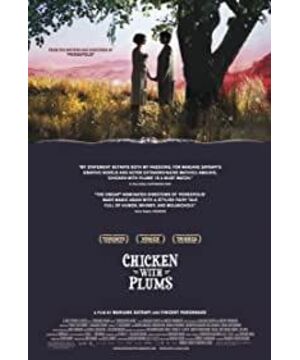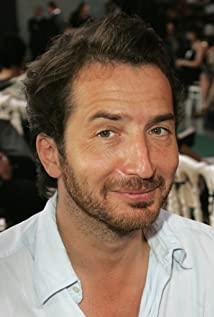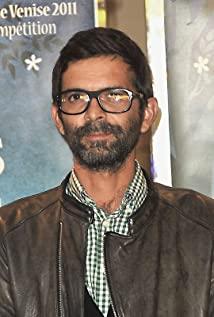The Smell of Chicken with Plum is the second feature-length work co-directed by Marga Chatape and Vincent Paland. Compared with the very famous debut work "I grew up in Iran" based on personal experience, "The Taste of Plum Chicken" is a commercial autobiographical film from a third perspective. (The prototype comes from Margaret Shatapi's uncle) In Christianity, God created all things in the world in seven days according to their importance. The events that Ali experienced or recalled in bed in the last eight days of his life are the key to the audience's understanding of the characters. Here, I will sort out Ali's last mental journey in these eight days, and try to distinguish between the memories, the protagonist's fantasy and the Director's expectations. first day. Ali imagined four suicide methods: lying on rails, jumping off cliffs, pistols, and sleeping pills, and finally decided to starve to death. The director presented the pictures imagined in Ali's mind one by one. The first two outdoor methods of death both occurred outdoors, while the indoor method of death was completed in a black background. After envisioning the first four tragic deaths, the director quickly cuts to Ali, showing his fear of extreme death. As Ali lay in bed waiting to die, he walked into the frame and put on his pajamas and lay on his bed. He first thought of the child: his daughter was as intelligent and sensitive as he was, extremely depressed and talented. The bass that runs through the whole article is a bystander in every detail. In the black background, the grown daughter plays poker with three men. In the gloomy and gloomy picture, the bass tells the story of her daughter. half life. At this time, I switched to Ali's reaction: calm or unknowingly calm. As a good parent who loves their children, especially a daughter who is similar to himself, if Ali knew of her daughter's romantic and bumpy life, she would not be unresponsive, and even smile at her daughter who has not grown up while swinging outside the window. Therefore, this section belongs to the director's expectation and presents a vision of the future. the next day. With the appearance of the younger brother, the director launched a retrospective of the past: the "interrogation meeting" of the troubled brother Ali and the honor student brother Abudi on campus. Broken glass windows, mottled reflections, and classmates with clear faces... Compared with Ali's vision on the first day, this memory has traces to follow, so many details of objects have been added. Amid the accusations, the scene transitioned to Abu Di rushing to Ali's bed. He brought his brother's fantasy about beautiful women. That night, Ali dreamed of slender girls and spent a pleasant abstract night. Day three. He thought that the body would die, but the spirit would remain forever, so he decided to imitate Socrates and called his two children in front of him to teach him his views on art and life. In the sound of his younger son's fart, he realized that his son was very different from him. At this time, the director stood in the perspective of God and put his son's In the second half of his life, his son's happy and mediocre future life is dramatically presented through collages and Hollywood techniques. The bright color setting and the exaggerated application of push-pull and panning are diametrically opposite to the style of the whole article, just like the different fates of the son and the father. The daughter even asserted that if Dad was alive, he would be so angry that his grandson's middle name was Nasser and his arteries would burst. I think this part is also part of the director's expectation. In this movie with Dad Ali as the protagonist, this "naysayer" behavior will not win the careful design, but should be ignored. After all, a sunny and cheerful son doesn't always get along well with a gloomy father. Fourth day. The wife made her husband Ali's favorite food: plum chicken. Plum chicken is Ali's favorite food. This taste is so important that after being unable to taste it, the protagonist Ali also lost hope of life. In the movie, plum chicken not only serves as a dish, but also reflects the violin, symbolizing the first love. Two objects and one person influence each other: After the violin given by the master is broken, the plum chicken loses its taste, because the plum chicken is the addition to the scenery, Ali lost the violin that carries the memory, and there is no beauty, no need to embellish it. Flowers; his superb violin skills are innate, but his perception of love is brought about by his first love. When he faces his first love, the love that he has been waiting for for half his life is also shattered. The sad tune based on this feeling has no meaning of existence, and the plum chicken has completely lost its taste. On this day he remembered that his wife smashed his violin in anger, and the director presented what happened in the past, but was forgotten: how Ali became the best violinist. Day 5. Before he died he thought of his dead mother. Ali once had a conversation with the mysterious old man about the smoke at his mother's grave. In my opinion, the mysterious old man is the embodiment of rationality and sensibility in Ali's heart. His ability to cover the sky with one hand is enough to prove that he is very human. When he coldly persuaded Ali to die in the first second, and angrily said that it was shameful to give up his life the next second, he also said that he would never bow to the wheel of fate. Sex provides evidence for the identity of the mysterious old man. At this time, Ali married Frankis according to his mother's wishes and became pregnant with the first child. However, in this unknown dialogue, it can be vaguely seen that Ali had suicidal thoughts. Ali had prayed that death would not take away his mother, but the mother rebuked: what should come will always come, and finally replace the process of death with the image of the smoke floating away. Smoke is the core imagery of the film, cigarettes, and smoke. Cigarettes relieved the suffering of the living, and also led to the death of Ali's mother and daughter, and there was only a thin line between redemption and death. Smoke is used in transitions many times. On the one hand, it echoes the reality, and on the other hand, the ethereal fog aggravates the yin of depression and death. The haze brings a visual experience of detachment and uncertainty. Day 6. Ali did not come into contact with reality or recall anything. In fantasy, the angel of death came, and in reality, death was approaching step by step. The director uses a pop-up book to bring the audience into the dialogue between the two, and uses animation to elicit the true thoughts that death cannot be undone, which also represents Ali's instinctive yearning for life before his death. Seventh day. Ali entered the last moments of his life, relatives came to visit Ali, and at his wife's prayer, Ali forgave his wife. Eighth day. He thought of Ilana, of the best years of his life he had spent with her. The director briefly described the story of the two again, from the beginning to the end, echoing the beginning, forming a closed loop, and finally remembering Ali from the perspective of Ilana. "The Taste of Plum Chicken" combines subjective and third-party perspectives, reality and fantasy, past and present, and presents an artist's life with a combination of virtual and real creative techniques, and also brings us a new perspective on film evaluation. Thinking.
View more about Chicken with Plums reviews











